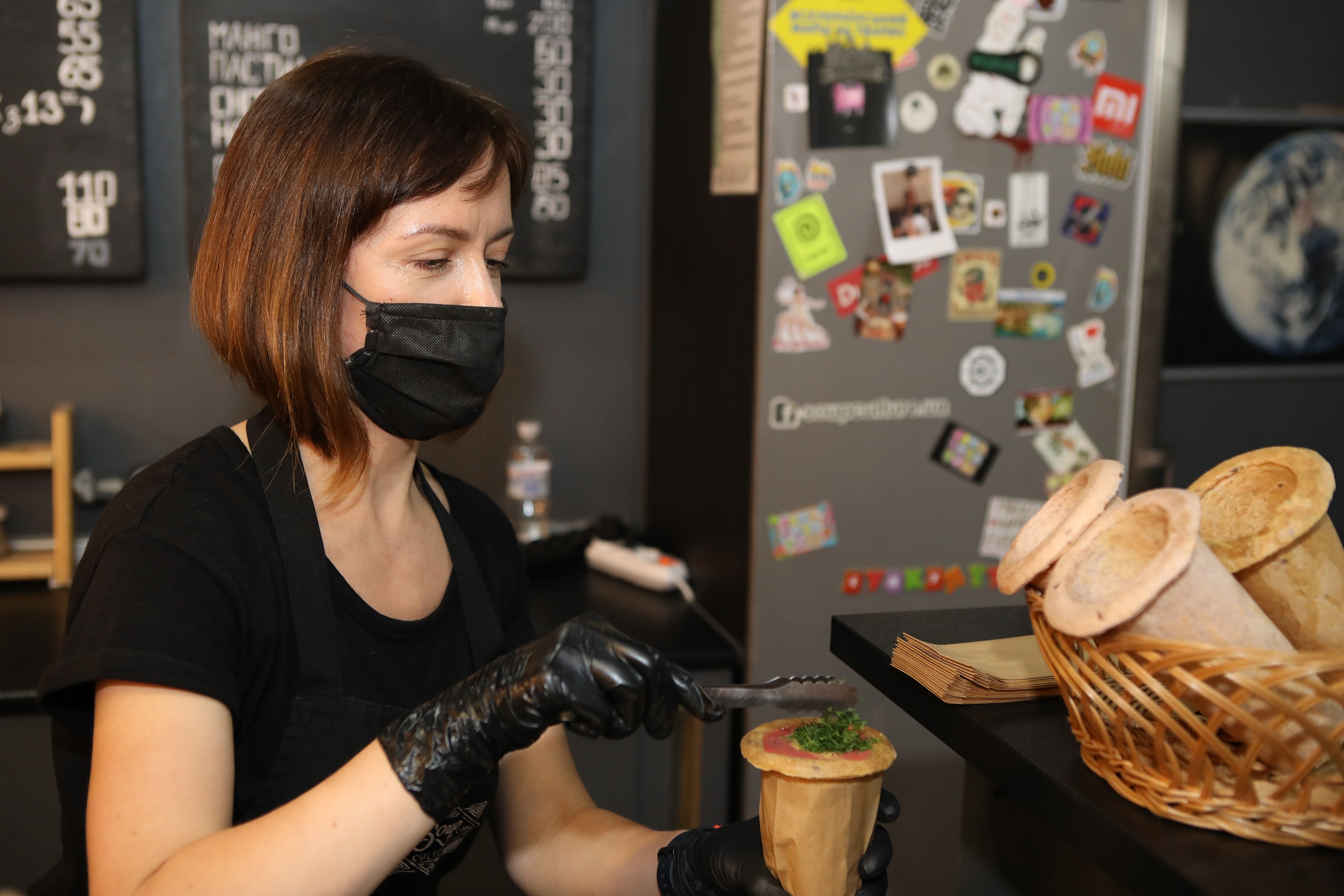Success stories: Soup as street culture
Supkultura, a chain of street food establishments, is known all over Ukraine and in 10 European countries for its vegetarian cream soups served in edible bread cups. Today, the chain has 24 franchised establishments and prepares for expansion into the United States. Kyrylo Puzenko, the founder of Supkultura, tells about how his business was established, what helped and what obstructed its growth.
Kyrylo Puzenko of Mariupol came to Kyiv in July 2014, after the outbreak of the War in Donbas, with the idea of a soup served in edible cups – an idea that was shaped up but not implemented. He began going to interviews to get a waiter’s job. The restaurant’s owner was present during one of these interviews, and Kyrylo told him about his idea. The owner got interested and became a business angel, giving Kyrylo 2000 dollars to start a business and charging no interest and setting no repayment deadline. This money was spent on developing a 3D model of a press form to bake bread cups, and then, they found a manufacturer who agreed to make special ovens. On 31 August, the idea was tested for endurance by presenting soups in cups at a street food festival held at Platform Art Factory. The product was original, tasty, healthy and “Instagrammable”, vividly standing out among regular street food. “From the very first day, everyone who tasted our soups were impressed and recommended to patent this idea (that’s what we have done later on),” Kyrylo recalls. However, the entrepreneur was aware of difficulties which he had to cope with.
During 2015, they participated in all street food festivals and were preparing for scaling. “When we were presented with the first version of an oven for baking of cups, the technologist was unable to make sure that the bread comes without holes and hot soup does not spill for a while. We kept trying, and eventually came up with an ideal recipe of a cream soup that was to taste of clientele. We also worked on improving the technology of producing a “reinforced” bread cup. In December 2015, we opened our first stationary Supkultura establishment at Khreschatyk Street in Kyiv. The first franchised establishment was opened in 2016 in Warsaw. Soon, more Supkultura vending points began to open. Today, these fast food establishments operate in 10 countries and in all Ukrainian cities with population of over a million.

Customers
The IT sector likes to order vegetarian soups in edible cups. This soup is easily digested, fills you up, and besides, it is convenient to eat from a cup with one hand, working on a computer. “Our main audience is women. These are those who prefer healthy food, and also, young mothers feeding their children with our soups while taking them on a stroll,” Kyrylo says.
There is a common misbelief that this soup is made from a powder. In fact, they cook the soup every morning from fresh vegetables. They do not use any precooked foods or frozen non-seasonal vegetables. For example, they do not serve pumpkin soup in summer – their menu has cold gazpacho, hot tomato soup, corn soup. Pumpkin soup and broccoli soup are popular in autumn. “We are trying to reduce carbon trace. This is my personal stance: to make sure that our project causes the lowest possible damage to the environment. We deliberately do not use meat and frozen foods,” Kyrylo shares his thoughts. Their audience likes that eco-friendliness, too.
Promotion eco-style
Cream soups from Supkultura are simply created for vegetarians and vegans, but their marketing does not place an emphasis on that. A meat soup cannot be a cream soup, for it won’t have such a tender texture. “My stance is ideological, but also ecological. For people who do not eat meat or fried food, we cook not only soups but also falafel.”
When doing targeting in social media, they were looking for enthusiasts of yoga, tourism, hiking. Their Facebook page contains general information and addresses of their establishments. Every location (franchisee) has their own Instagram page, but they all share visual content, including cross-posting. Standers indicate direction to offline establishments, and they use the minimum of printed leaflets, flyers and posters for environmental considerations. The word of mouth does an excellent job. Their product is photogenic from marketing viewpoint – people want to post its photos on Instagram. One of the locations counted the number of mentions, and came up with the figure of 1500 per year.

Difficulties
The popularity of Supkultura brought its owners not only profits but also losses. Thus, the company from which they ordered ovens made to an original design began selling their 3D forms to others as their own product. Some enterprising imitators, not being Supkultura’s franchisees, began to open establishments trying to create their own “soups in bread cups”, but often, they would quickly go out of business. According to Kyrylo, two-four persons wanting to open a Supkultura establishment contact them every day, but less than 1% actually buy a franchise. The percentage of success in this business is high: out of 24 locations opened in the past four years, only four have closed for various reasons – first of all, because of the wrong choice of location. Considering the present time of turbulence and crisis, this indicator is not that bad.
Polevka for some, hot dog for others
In Ukraine, Supkultura became a brand in just a few years and has occupied its niche in the street food culture, but for understandable reason, their sales turnover has visibly declined during the quarantine. Mr. Puzenko looks with hope into foreign markets, where the purchasing capacity of population is higher and a hipster soup in a bread cup is a food everyone can afford.
Riding the fashion wave, the unusual Ukrainian soups were selling well in Poland in 2016-2017 and the market was stable, but no good market development dynamics could be expected due to absence in that country of the habit of eating the first course. The neighboring Slovakia is a quite different matter: there, polevka is an indispensable course of a dinner meal.
Ukraine, Belarus, Russia, Georgia, Poland, Czech Republic, Slovakia, Sweden, United Kingdom love soups in bread cups. In Norway, Supkultura is represented, for the time being, only at street food festivals, and a local franchisee is doing a market research. Puzenko sees a huge potential in the American market, where people also love soups, where there is a sophisticated IT industry and where there is a lot of vegetarians.
Soup franchise
A Supkultura franchise costs 8 thousand euros. It includes a 3000-euro oven manufactured in Poland and capable of covering the daily need in 250 cups. By the way, the founders estimate that if you sell 200 cups a day, your profit will be over 5 thousand euros per month.
The requirements to the premise are minimal: it must have water and power supply, and the recommended space is from 30 sq.m. Some establishments are housed in street kiosks, but that’s not the best option. “If people begin to compromise when opening a business and save on space or wages beforehand, they will sell less and have less profit. The smallest establishments with one hired employee sell up to 80 cups of soup per day. But as a self-employment option, it’s quite possible, too,” Kyrylo believes.
It takes 2-4 months after paying franchise fee to open an establishment. The franchise pays itself back in 9 to 16 months. The partner will receive soup cooking technology and recipes, a brand book, personnel hiring instructions, support and experience exchange in a closed community, and a closed section on the corporate website. And of course, assistance with promotion.
“We are one of the most loyal franchisers in the market: we do not require royalties on turnover if you don’t have profit. We consider that force majeure circumstances,” Kyrylo Puzenko says. At the same time, the businessman says: there is a risk that some franchisees simply hide profit; in that case, they use services of a mystery shopper to make a check on the franchisee.

Quarantine
All Supkultura franchisees survived the quarantine. Nobody closed down, even though they weren’t working for a month. They did not switch to operation in a closed regime or to food deliveries. Even though they worked with various food delivery aggregators like Raketa before, this area isn’t very developed. “We have no special anti-crisis solutions. We hope that sooner or later, the situation with virus will stop. But if it won’t, we will create our own service to deliver meals directly to offices,” Kyrylo admits. Still, there are some achievements from the quarantine. The founders learned to open locations online. Thus, a location was opened online in Tomsk, and another one in July in a small town near London, United Kingdom. And the preparation for the opening of the first Supkultura establishment in the United States also takes place online.
Keep dreaming!
The company’s plans for the future are optimistic. “We wish we could cover the entire northern hemisphere, where climate and culture are very much in favor of eating hot soups,” Kyrylo smiles. “We are in talks to open our locations at ski resorts in Switzerland. The next target is Belgium, a soup eating country.” Puzenko also has a word for those who have a business idea that nobody else can understand: “Listen to yourself! When in 2014 I was visiting my friends and telling them that I invented a soup in an edible cup, one in a 100 at the most was saying that it’s interesting. The rest were trying to convince me that nobody needs it, that nothing will come out of it and that I should not waste time on it. And here we go: a whole Supkultura chain, which many need. If you are sure about your idea, go ahead and do it. It’s better to make a mistake than not even trying to do it.”
Working with Raiffeisen Bank Aval
Kyrylo Puzenko, founder of Supkultura chain:
“I have been a customer of Raiffeisen Bank Aval from the very launch of our business in 2016. I have my business accounts and my personal accounts with this bank. We are exporters, and therefore, we receive international payments in foreign currencies from our franchisees in 10 countries. For me, the bank’s reliability is very important, as well as its stability typical for Austrian banks, and also, security of transactions. I appreciate the huge emphasis made on digital security of online banking.”
Oleh Herasymov, Chief Financial Officer of Supkultura chain:
I am a customer of Raiffeisen Bank Aval both as a director of Supkultura and as an entrepreneur. Opening an account in any currency with this bank is fast and convenient. It also is very simple to convert foreign-currency proceeds into hryvnias (there is even no need to use a transit account). To receive proceeds in foreign currency, all you need to do is to bring a contract. No obstacles. If some details are missing or if a letter is needed, the bank will call me and let me know. Service is the main thing which I like in this bank. They have very good personnel, who will always help, suggest, make it for you, and will never have you wait. It’s convenient to use a credit card to buy airline tickets and receive bonuses for that. I always recommend our franchisees to use the acquiring service from Raiffeisen Bank Aval.















